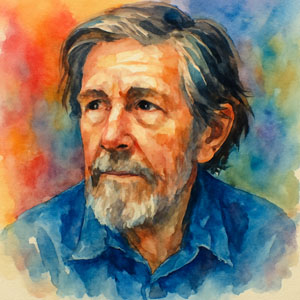— John Cage
 A beacon of new ideas, experimental artist John Milton Cage Jr. (1912–1992) was born on this day in Los Angeles, California. A great composer and poet, he has been called one of the top three philosophers of the 20th century.
A beacon of new ideas, experimental artist John Milton Cage Jr. (1912–1992) was born on this day in Los Angeles, California. A great composer and poet, he has been called one of the top three philosophers of the 20th century.
"If something is boring after two minutes, try it for four. If still boring, then eight. Then sixteen. Then thirty-two. Eventually one discovers that it is not boring at all," he said.
Cage began piano lessons in grade school and graduated at age 15 as his high school's valedictorian. Inspired by Gertrude Stein's writing, he traveled to Europe to explore modern art (he fell in love with Gothic architecture in Paris), then returned to the U.S. to embrace avant-garde music.
"The first thing I learned from John Cage," explained writer Kathan Brown, "was that the purpose of art is to sober and quiet the mind, encouraging a state that is spiritual in nature but at the same time is connected to everyday life."
Always exploring, Cage first studied tonal harmony with revolutionary composer Arnold Schönberg, then applied Zen Buddhist principles to composing. His work celebrated innovation and freedom. Often, his art inspired debate.
He understood the power of silence.
"That's noise!" some complained. "That's life," Cage answered.
"My father was an inventor," Cage wrote in his autobiography. "He was able to find solutions for problems... He told me that if someone says 'can't' that shows you what to do. He also told me that my mother was always right even when she was wrong."
 Change the limits with new ideas.🎶
Change the limits with new ideas.🎶
